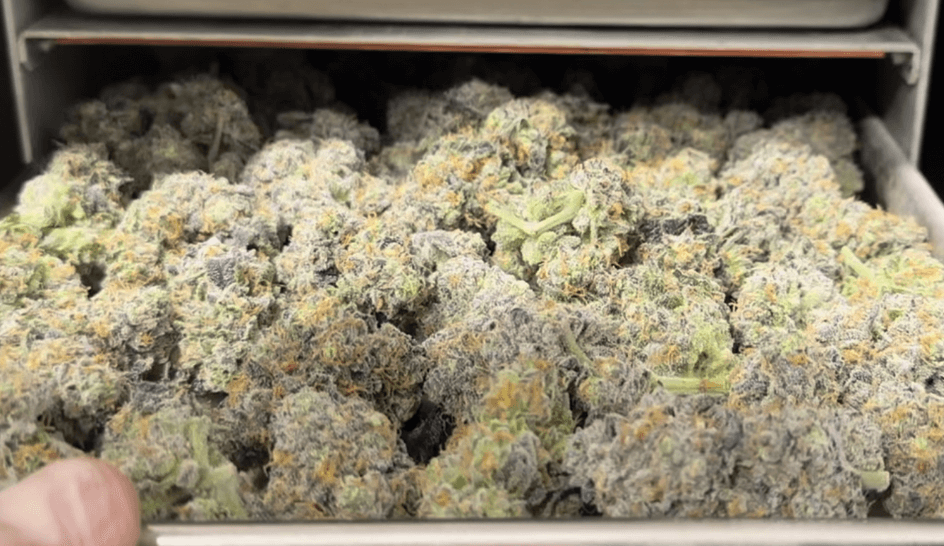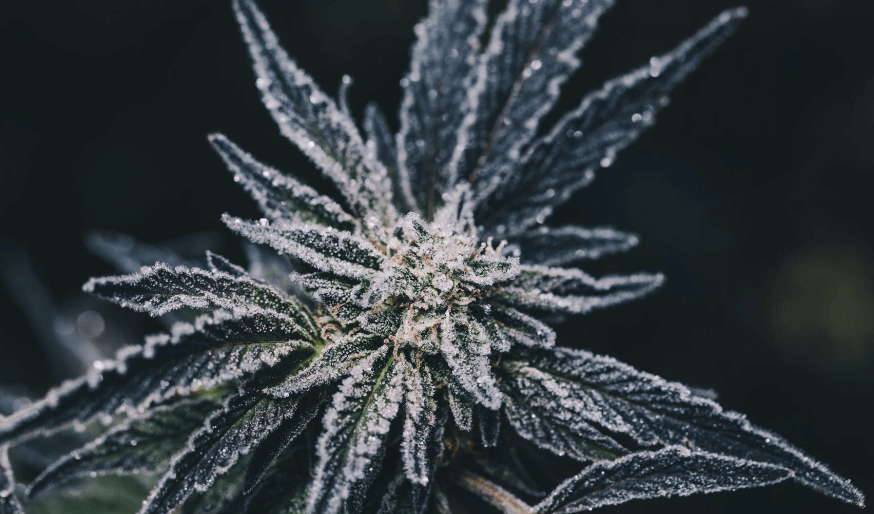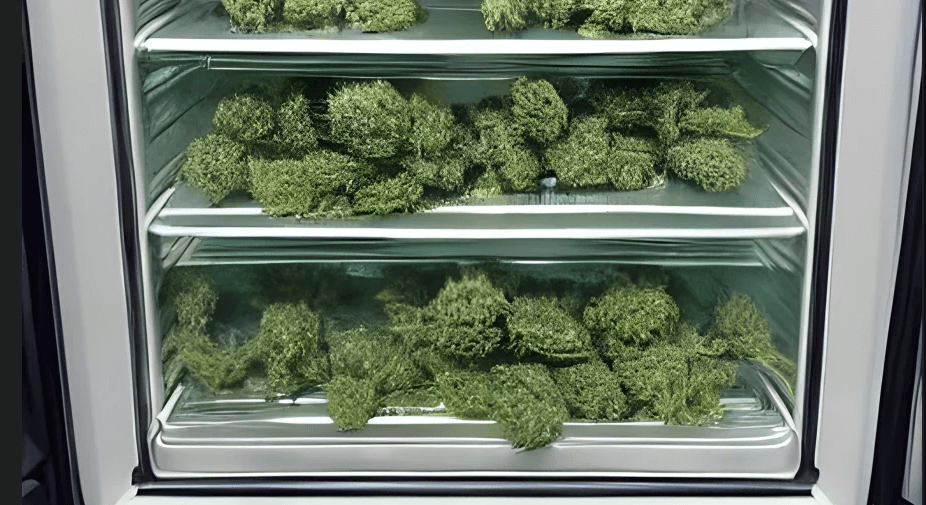Key Takeaways
- While freezing cannabis can extend its shelf life, it may compromise the quality by damaging trichomes and altering flavor and potency.
- Airtight containers like mason glass jars, CVault, or Cannador provide better conditions for preserving fresh cannabis flowers without the drawbacks associated with freezing.
- The best method for storing cannabis depends on individual preferences for quality versus convenience, and the frequency of use.
Keeping cannabis fresh and effective is a crucial concern, sparking a lively debate around the question: “Can you freeze weed?”
While some advocates suggest that freezing cannabis can help maintain its potency and extend its shelf life, others raise concerns about potential negative impacts on quality, such as alterations in taste and smell.
This discussion explores these varied perspectives to understand better whether freezing weed is a beneficial preservation method.

The Science of Freezing Weed
Cannabis contains a complex array of biological and chemical components, including cannabinoids like THC and CBD, as well as aromatic compounds known as terpenes. These elements contribute to the therapeutic and sensory properties of cannabis [1].
When you freeze weed, these components can be affected in different ways. THC, the psychoactive component, and CBD, known for its medicinal benefits, might not degrade significantly, but the freezing process can cause the fragile trichomes where these cannabinoids are stored to become brittle and break off.
This not only reduces potency but also the overall effectiveness of the cannabis. Terpenes, which give cannabis its distinctive flavors and aromas, can also be altered by freezing, potentially dulling the taste and smell of the weed.
Understanding these impacts is crucial for deciding if freezing is the right method for preserving your cannabis.
Pros of Freezing Weed
Freezing weed might offer some benefits, particularly when considering long-term storage and moisture preservation. Here are a couple of advantages to consider:
- Long-term storage: Freezing can potentially extend the shelf life of a cannabis flower by slowing down the degradation process of cannabinoids and terpenes. This can be particularly useful for those who don’t use cannabis frequently and need a way to preserve it for longer periods.
- Preservation of moisture content: By freezing cannabis, you might help maintain the natural moisture of the buds. This prevents them from drying out and becoming brittle, which can degrade the quality and experience of use.
- Reduced risk of mold and bacteria: Freezing can help inhibit the growth of mold and bacteria on cannabis. By keeping the buds at low temperatures, the environment becomes less hospitable for these contaminants, potentially leading to a safer product.
- Consistency in quality: Freezing can help maintain a consistent quality of cannabis over time. By reducing the exposure to varying environmental conditions such as light, temperature, and humidity, the characteristics of the cannabis, such as potency and flavor, can be preserved.
- Convenience: For users who buy in bulk or harvest their own cannabis, freezing offers a convenient way to store weed in large quantities without cluttering storage spaces like cabinets or closets.
These additional benefits show that freezing can be a versatile method for maintaining the quality and safety of cannabis under the right conditions.
Cons of Freezing Weed
While freezing weed might offer some benefits, there are also notable drawbacks to consider. Here’s a look at some of the cons associated with freezing cannabis:
- Risk of trichome damage: Freezing can cause the delicate trichomes on cannabis buds, which house important cannabinoids and terpenes, to become brittle. This brittleness can lead to breakage, reducing the overall quality and therapeutic potential of the weed.
- Impact on taste and potency: The process of freezing may alter the flavor profiles of cannabis and reduce its overall potency. Temperature changes can affect the terpenes that contribute to the unique taste and aroma of each strain.
- Decarboxylation issues: Freezing can impede the decarboxylation process, which is necessary for converting THCA into the psychoactive THC. This means that frozen weed may not be as effective, especially if used for therapeutic purposes where active THC is required.
Understanding these drawbacks is essential for anyone considering freezing as a method for storing weed.
Best Practices for Freezing Cannabis

Freezing cannabis can be a viable option for long-term weed storage if done correctly. Here’s a step-by-step guide on how to freeze weed to minimize damage, along with the importance of using airtight containers:
- Choose the Right Containers: Use airtight containers to store your cannabis. Vacuum-sealed bags or containers specifically designed to be airtight can prevent air exposure and help maintain the integrity of the cannabis. This is crucial to avoid freezer burn, which can dry out your buds and significantly reduce their quality.
- Prep Your Cannabis: Ensure your cannabis is properly cured before freezing. Curing helps stabilize moisture content and ensures that the plant’s essential oils, cannabinoids, and terpenes are preserved. Uncured or improperly cured cannabis may contain too much moisture, which can lead to ice crystal formation that damages the trichomes when frozen.
- Portion Your Weed: Divide your cannabis into small, usable portions. Freezing your cannabis in the amounts you typically use can prevent the need to refreeze, as repeatedly changing the temperature can degrade the quality further.
- Avoid Contamination: Handle your cannabis with clean hands or gloves to avoid introducing contaminants. Also, make sure the container is clean and dry before use.
- Label Your Containers: Mark each container with the strain type and the date of freezing. This can help you track how long your cannabis has been stored and use older stocks first.
- Place in Freezer: Once packed and sealed, place your containers in the freezer. Opt for the back of the freezer where the temperature is most constant, as frequent temperature changes from opening the door can affect the quality.
- Thawing: When you’re ready to use your frozen cannabis, allow it to thaw slowly in the container at room temperature. This gradual process helps preserve the quality of the marijuana.
By following these steps, you can help ensure that your frozen cannabis remains as fresh and potent as possible. Proper storage is key to maintaining the therapeutic and recreational qualities of your weed.
Alternatives to Freezing
Mason Jars: A Simple and Effective Solution
Mason jars are a simple and effective solution; they are airtight, inexpensive, and readily available, making them a popular choice for many users. These jars keep out moisture and air, which are critical factors in cannabis degradation.
The clear glass also allows for easy inspection of the contents, though it’s advisable to store them in dark places to protect against light exposure.
CVault: Advanced Humidity Control
The CVault is another level up, designed specifically for cannabis storage. It combines an airtight lid with humidity control packs to maintain an optimal environment inside the container.
This system not only preserves freshness but also the integrity of terpenes and cannabinoids, crucial for both flavor and efficacy.
Cannador: Premium Storage for Connoisseurs
Cannador offers a premium solution with separate compartments for different strains, each equipped with its own humidity control. This is ideal for enthusiasts who want to maintain the unique profile of multiple strains without the flavors mingling.
Comparison with Freezing
Compared to freezing, these methods are more effective in maintaining the natural state of cannabis without the risk of trichome damage due to ice formation.
They also avoid the inconvenience of having to thaw the product and potentially dealing with the issues of moisture introduced from condensation during freezing and thawing.
For everyday use, where ease and consistency are key, mason jars, CVault, and Cannador provide superior convenience and effectiveness.
Frequently Asked Questions
Can Freezing Cannabis Really Extend Its Shelf Life?
Freezing has the potential to significantly extend the shelf life of cannabis by slowing the natural degradation process of cannabinoids and terpenes.
However, users should be cautious of the risks, such as trichome damage and moisture issues, which can negatively impact the overall quality and effectiveness of the cannabis.
Does Freezing Weed Affect Its Potency?
The potency of cannabis can be affected when frozen due to the increased likelihood of trichome breakage, where the essential cannabinoids are stored.
Moreover, freezing can inhibit the decarboxylation process, which is vital for converting non-psychoactive THCA into psychoactive THC, potentially reducing the effectiveness of cannabis when used.
What Is the Best Way to Freeze Cannabis?
The best practice for freezing cannabis is to utilize airtight containers or vacuum-sealed bags, which help minimize exposure to air and moisture.
This approach significantly reduces the risk of freezer burn and helps protect the trichomes, thereby preserving the cannabis’s quality and therapeutic properties.
How Should I Thaw Frozen Cannabis to Ensure Quality?
Thawing frozen cannabis should be done slowly at room temperature while it remains in its airtight container.
This method helps prevent the formation of condensation, which can introduce unwanted moisture and potentially lead to mold growth, thus ensuring the cannabis retains its quality and potency.
Are There Any Risks Associated With Freezing Cannabis?
The primary risks associated with freezing cannabis include moisture buildup that can lead to mold, a reduction in flavor and aroma due to terpene degradation, and a decrease in potency from trichome damage.
These risks must be considered carefully to determine if freezing is the appropriate storage method.
Conclusion
Deciding whether to freeze cannabis depends on your priorities. Freezing can preserve cannabis for long periods, making it suitable for infrequent users who need long-term storage. However, it risks damaging trichomes, altering flavor, and impacting the activation of THC.
For those valuing quality, alternatives like mason jars or CVault offer better conditions for preserving the integrity of cannabis without the drawbacks of freezing.
Ultimately, the choice between freezing and other methods should balance personal usage patterns, quality preservation, and convenience.
Sources –

